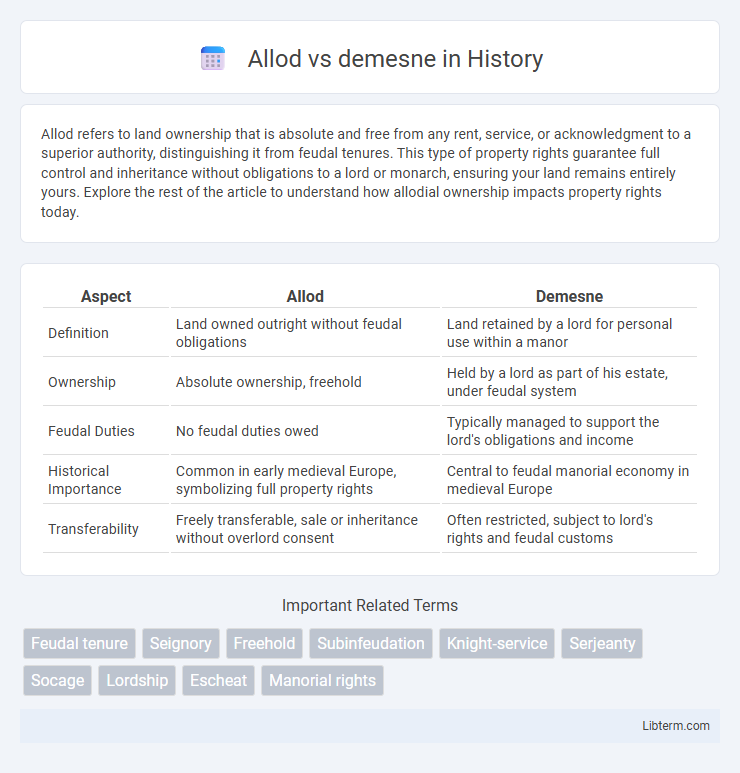Allod refers to land ownership that is absolute and free from any rent, service, or acknowledgment to a superior authority, distinguishing it from feudal tenures. This type of property rights guarantee full control and inheritance without obligations to a lord or monarch, ensuring your land remains entirely yours. Explore the rest of the article to understand how allodial ownership impacts property rights today.
Table of Comparison
| Aspect | Allod | Demesne |
|---|---|---|
| Definition | Land owned outright without feudal obligations | Land retained by a lord for personal use within a manor |
| Ownership | Absolute ownership, freehold | Held by a lord as part of his estate, under feudal system |
| Feudal Duties | No feudal duties owed | Typically managed to support the lord's obligations and income |
| Historical Importance | Common in early medieval Europe, symbolizing full property rights | Central to feudal manorial economy in medieval Europe |
| Transferability | Freely transferable, sale or inheritance without overlord consent | Often restricted, subject to lord's rights and feudal customs |
Introduction to Allod and Demesne
Allod refers to land owned outright without any feudal duties or obligations, granting the holder full and independent ownership rights. Demesne typically denotes land directly controlled and exploited by a lord for personal use, distinct from lands granted to vassals. Understanding the distinction between allodial ownership and demesne tenure is crucial for grasping medieval property law and land tenure systems.
Historical Origins of Allod and Demesne
Allodial land originated in early Germanic and medieval European societies as property held free from feudal duties or overlordship, granting absolute ownership rights to the holder. In contrast, demesne referred to land retained directly by a lord for personal use or income, central to the feudal manorial system where tenants owed service or rent. The evolution of these landholding concepts reflects the shift from tribal land tenure systems to structured feudal governance during the Middle Ages.
Definition and Legal Distinctions
Allod refers to land owned absolutely without any feudal duties or obligations, granting the owner full sovereign rights. Demesne indicates land retained by a lord for personal use and management, often worked by serfs or tenants under feudal tenure. The key legal distinction lies in allodial land being freehold property, whereas demesne land remains part of the lord's estate under feudal hierarchy and obligations.
Allod: Characteristics and Examples
Allod refers to land ownership that is freehold and absolute, without any obligations of service or rent to a superior lord, differing from demesne which is land retained by a lord for personal use or direct control. Characteristics of allodial land include complete legal ownership, transferability without feudal approval, and immunity from feudal duties, making it a symbol of ultimate property rights in medieval European law. Examples of allod holdings can be found in regions such as parts of Germany, Switzerland, and Scandinavia, where landowners held estates independent of feudal tenure systems.
Demesne: Meaning and Significance
Demesne refers to land retained by a lord for personal use, rather than leased to tenants, forming the core estate in feudal systems. This land was directly managed to support the lord's household and generate economic resources, illustrating power and control over surrounding territories. Unlike allodial land, which is owned outright without feudal obligations, demesne embodies the hierarchical structure of medieval land tenure with obligations and service tied to lordship authority.
Ownership Rights in Allod vs Demesne
Ownership rights in allodial land grant complete and absolute control to the owner, free from any superior landlord or sovereign claims, allowing unrestricted transfer, sale, or inheritance. Demesne land, often held by a lord or monarch, involves conditional ownership where rights are limited by feudal obligations, such as rents, services, or allegiance owed to the overlord. The distinction lies in allodial rights providing full sovereignty over property, whereas demesne ownership operates under a hierarchical framework restricting full autonomy.
Feudal Systems and Property Structures
Allod represents land ownership free from feudal duties, where the holder retains full control without obligation to a superior lord. In contrast, demesne refers to land retained directly by a feudal lord for personal use or profit, often worked by serfs under feudal obligations. The distinction between allodial and demesne properties highlights the hierarchical nature of feudal systems, reflecting varying degrees of property rights and servitude within medieval land tenure structures.
Evolution of Land Tenure Systems
Allodial land represented absolute ownership free from feudal obligations, while demesne referred to land retained by a lord for personal use within the feudal system. The evolution of land tenure systems saw a gradual shift from allodial holdings to complex feudal relationships, where land was held in exchange for service or rent. This transition illustrates the transformation from decentralized, individual land ownership to hierarchical, obligation-based tenure that defined medieval European society.
Modern Implications of Allodial and Demesne Ownership
Allodial ownership refers to absolute property rights held without any superior landlord, providing the owner with full control and immunity from feudal duties, whereas demesne ownership involves land held directly by a superior lord, often with associated obligations or rents. In modern property law, allodial titles are rare and mostly symbolic, contrasting with demesne concepts that persist through leaseholds, freeholds, or state-owned lands subject to regulations and taxes. The practical implications highlight issues of sovereignty, tax liability, and regulatory control, influencing debates on land rights, eminent domain, and private property protections.
Conclusion: Key Differences and Relevance Today
Allod refers to land held in absolute ownership without obligations to a lord, while demesne denotes land retained directly by a lord for personal use, often subject to feudal duties. The key difference lies in the extent of ownership rights and associated feudal obligations, with allodial land providing greater autonomy. Understanding these distinctions remains relevant today for interpreting property rights evolution, influencing modern land tenure systems and legal frameworks worldwide.
Allod Infographic

 libterm.com
libterm.com